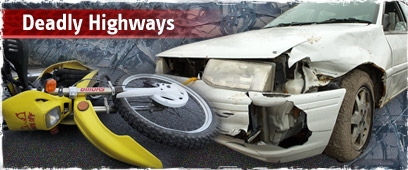

Contrary to popular belief, the Israeli judicial system is not lenient when in comes to road offenders. The calls for harsher punitive action and severe sentences become louder and louder with each report of more lives lost due to reckless driving.
"We lack proper enforcement, that's why so many drivers disregard traffic laws," say the experts. "Drivers know they have little chance of being published." Add to that an armful of legislative initiatives, which do little more than undermine the public's faith in the Legislative Authority and you have a sure recipe for public discontent.
However, those of us who are familiar with the realities of Traffic Court, know just how different reality is. As a defense attorney who frequents Traffic Court I know first hand how much progress has been made and how harsher they sentenced ruled today are, compared to a few years ago.
Up until a few years ago, the courts were inclined give a driver convicted of vehicular manslaughter due to a momentary distraction, for instance, a suspended sentence at best and six-months of community service as worst, and suspend his license for three-to-five years. Under today's sentencing guidelines, such a driver faces between 12 and 18 months in prison, at least six-months of community service and an eight-to-10 year suspension of his drivers license. Moreover, many drivers involved in deadly accident face the more aggravated charge of manslaughter, which carries a three-to-five years mandatory prison sentence; which and in some cases can come up to eight years.

Sufficient punishment? (Archive photo: Hagai Aharon)
Under today's guidelines, a driver crossing an intersection in a red light and causes a fatal crash is looking at manslaughter charges, which are punishable by up to 20 years in jail.
Potential death sentence
Traffic Court judges find themselves overwhelmed with driving-under-the-influence (DUI) cases. The fact that anyone who decides to get behind the wheel of a car while inebriated poses a risk to himself and to others, goes without saying, and so a DUI carries an automatic suspension of one's driving license for two years – an appropriate punishment. Experience has demonstrated, however, that many of these drivers are not "verbally drunk", as they are often found to be in full control of their faculties. Luckily, the courts don’t care – if the defendants' blood alcohol level exceeds the legal limit, their license will be suspended.
The courts are tougher on drivers who cause non-fatal accidents as well. Drivers who have prior convictions face harsher sentenced than first-time offenders. The public is simply unaware of the severity of punitive action exuded by Traffic Courts.
Many drivers choose to go to trial – as opposed to paying a large fine – and tell the judge their version of what happened, thinking it would not be more than a casual conversation. They are oblivious to the fact that the person presiding over the hearing is paid to punish them to the full extent of the law. They are also oblivious to the fact that appealing a Traffic Court ruling is not an easy thing to do, for the courts do not want to seem lenient.
One must also remember that even the harshest of punishments will not deter those who are unaware of the danger, nor will it make any difference for a driver who made a split-second mistake and ended up taking a life. If my experience has taught me anything, it's that most of the drivers who cause fatal accidents are no different than you or I – law abiding drivers who simply made a disastrous mistake. In their case, no amount of deterrence will do.
At the end of the day, the risk of being involved in a fatal car crash should serve as the biggest deterrence of them all. After all, the sentence once risks there in a sentence no Israeli court has the jurisdiction to render – the death sentence.
Attorney Elon Oron is a traffic law specialist















